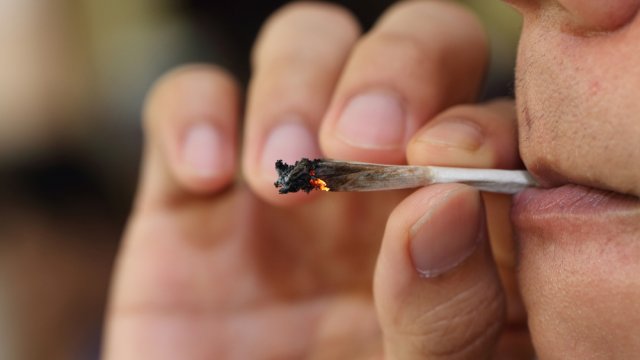Since 1996, when California became the first state to legalize medical cannabis, the national landscape of drug use has changed dramatically. Now, medical cannabis is legal in 38 states and the District of Columbia.
Last year, President Joe Biden signaled a new, softer federal government view of weed as well.
"That the federal government currently classifies marijuana as a Schedule I substance, the same as heroin, LSD and more serious than fentanyl, makes no sense," he said. "I'm asking the secretary of Health and Human Services and the attorney general to initiate a process to review how marijuana is scheduled under federal law."
The number of Americans who have used cannabis in their lifetime rose from 125 million in 2009 to 128 million in 2021. Meanwhile, the U.S. Chamber of Commerce says nearly two million fewer Americans are working today compared to February 2020. Government data, however, disputes this as the Bureau of Labor Statistics reports 155.6 million Americans worked in April 2023, up from 152.3 million in February 2020.
"We have a lot of jobs, but not enough workers to fill them. If every unemployed person in the country found a job, we would still have 4.2 million open jobs," the Chamber wrote recently.
The Bureau of Labor Statistics reports 9.6 million job openings, as of March 2023, while the agency reported 5.8 million on unemployment.
These factors have employers asking the question: should we continue to screen job applicants for drug use?
SEE MORE: Researchers find link between cannabis use disorder and schizophrenia
In a survey of some 45,000 companies worldwide, the staffing firm Manpower Group found that in 2021, 9& were eliminating drug tests for prospective employees.
That year, Amazon, the nation's second-largest private employer, announced it would no longer test job candidates for marijuana. One lawyer told the website HR Deep Dive that "very few regional businesses in the mid-Atlantic region are doing regular drug testing."
Meanwhile, lawmakers around the country have been active on the issue.
According to the marijuana advocacy group NORML, Nevada, Washington state, Atlanta, Baltimore and Philadelphia are among the jurisdictions that have passed legal restrictions on pre-employment tests.
In Colorado, lawmakers tried to change the way companies conduct drug testing. The idea was to allow exceptions for those using weed off the clock.
"It's discriminatory to say that you can drink alcohol during your free time, but you can't use marijuana when they are both legal here in the state of Colorado," said State Rep. Jovan Melton.
The bill died, and some employers in the state are wary of giving up the practice.
"Any employer is always going to be concerned about any litigation amongst employees against they themselves. You know, that's why they’ve always recommended that there be zero tolerance policies in place," said Loren Furman with the Colorado Chamber of Commerce.
The federal government, the nation's largest employer, is also changing how it thinks about drug testing. The New York Times reported that the military recently granted grace periods to more than 3,400 recruits who failed a drug test before joining the armed forces.
SEE MORE: Beware of discarded joints. They pose a risk to your pet
The Times says the CIA and FBI have also relaxed their rules regarding past use of marijuana. The Secret Service says candidates are eligible for employment one year after they have last consumed the drug. And the federal Bureau of Alcohol, Tobacco, Firearms and Explosives and the Department of Transportation (DOT) have also loosened rules.
But not all leaders in the federal government are embracing the change. Marine Corps Gen. David H. Berger wrote in 2019 that he was "troubled by the extent to which drug abuse is a characteristic of new recruits and the fact the vast majority of recruits require drug waivers for enlistment."
New kinds of drug tests, meanwhile, are giving employers more useful information. Chemical markers of THC, a main component of cannabis, can be detected in urine for months after consumption. Last year, the DOT said that saliva tests could be used instead since they more accurately show recent use.
Saliva testing also offers the advantage that employees can be observed by officials, while urine sampling raises privacy concerns.
SEE MORE: 'Joint' venture: Ben from Ben & Jerry's starts pot nonprofit
Trending stories at Scrippsnews.com




